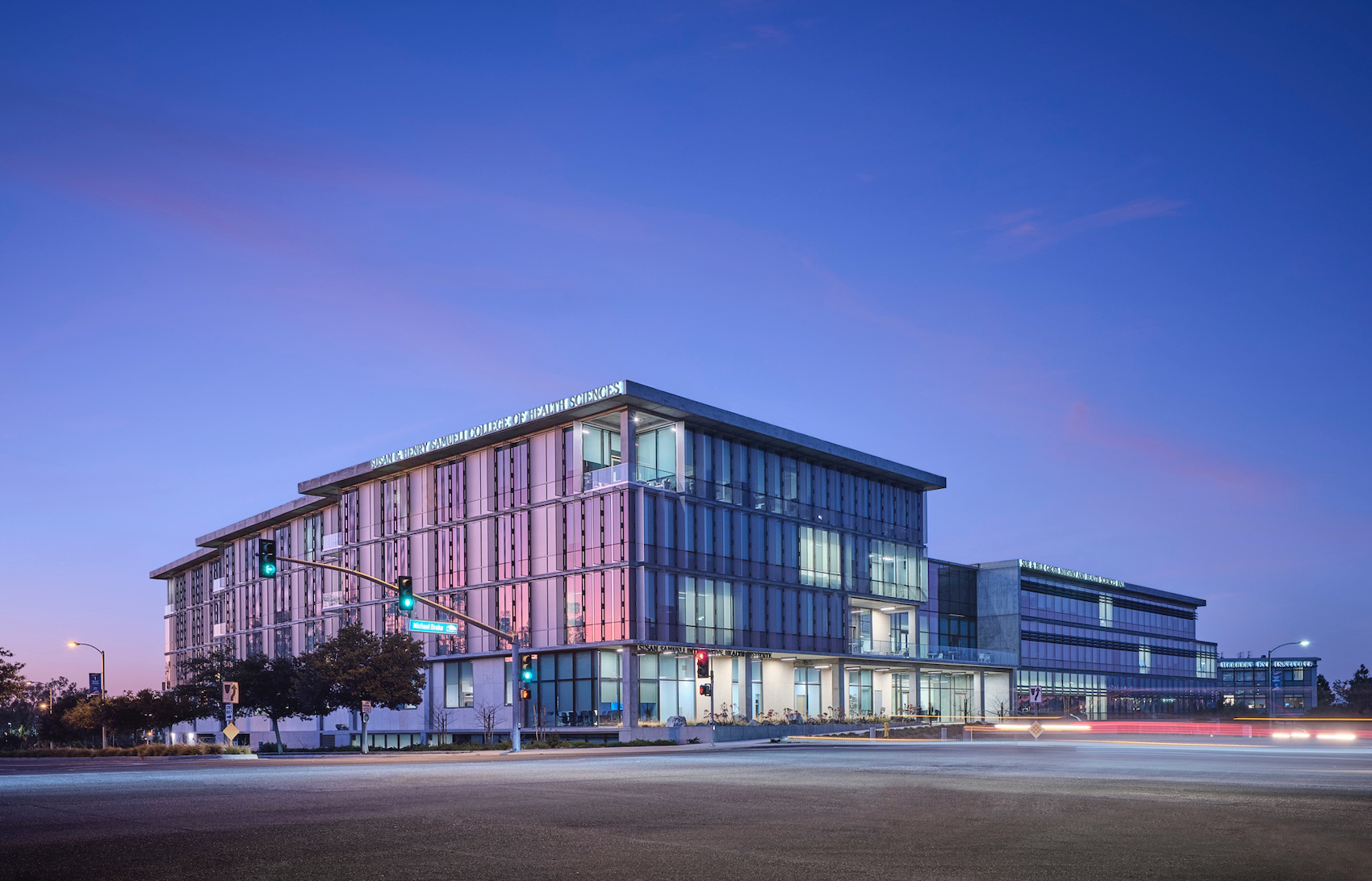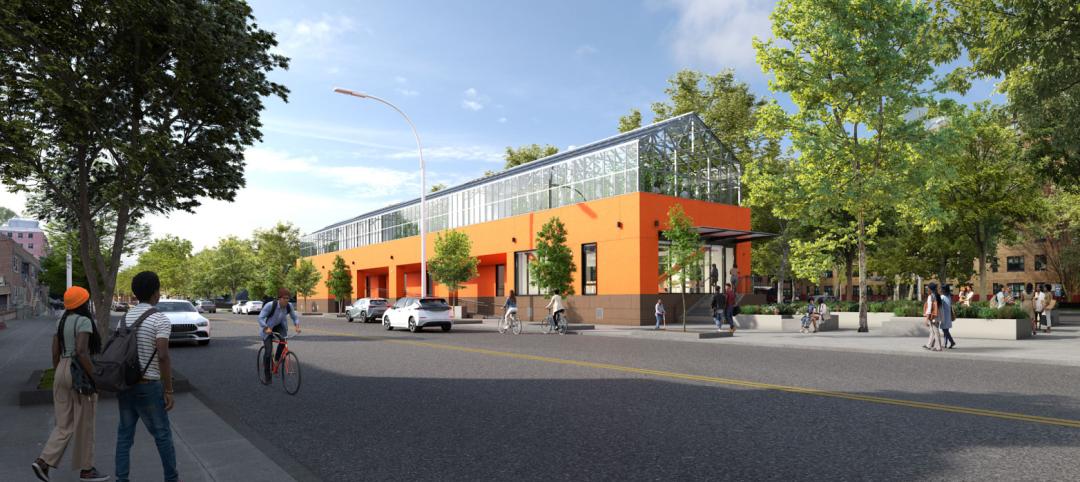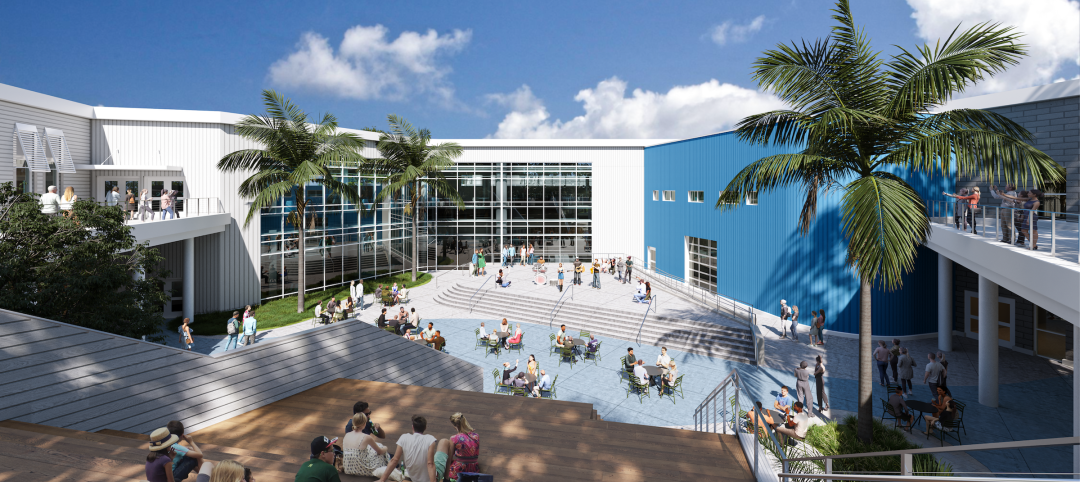The new College of Health Sciences Building and Nursing & Health Sciences Hall at the University of California Irvine supports the institution’s goal of becoming a national model for integrative health. The new 211,660-sf facility houses nursing, medical doctorate, pharmacy, philosophy, and public health programs in a single building.
With biophilic elements incorporated throughout the LEED Platinum building and a natural courtyard, students are taught holistic mind, body, and spirit benefits of nature in a medical setting. The building features teaching labs, a simulation center, and dedicated lounge space with access to beautiful outdoor spaces, community spaces, and natural elements.
“These elements come to together to not only improve students’ learning outcomes, but also their health and wellness with access to nature and daylight, chances for building community and interaction between disciplines, and enriching research and learning through exposure to other programs, practitioners, clinicians, and students,” according to a news release.
Notable features of the facility include:
- Stand-alone auditorium and pre-function space acting as a center of activity, a gateway to campus, and a resource for all four UCI Health Sciences and other university events
- Distinct identities/signature spaces associated with each building
- A distinctive dedicated two-story lobby space with a living wall
- A high visibility, dedicated entry for the clinic that builds community among patients and staff and connects treatment functions on both levels
- A “main street” corridor that connects Research Neighborhoods to enhance collaboration, sharing of resources, and scalability
The project was designed according to a “Heart, Home and Integrator approach,” says Martha Ball, Higher Education Sector Leader, HED. “The heart is the dedicated entry and experience of the building that builds a sense of community among patients and clinicians. The home is the lounge that opens to a quiet outdoor area for respite, facilitating individual and group activities and studies. The integrator is the central courtyard with dedicated entry experiences for each program, the auditorium within the courtyard, and the glass bridge that connects the two wings. These come together to create chance encounters of researchers, faculty, clinicians, and administration.”
Bringing together medical programs “creates a premium experience that enhances learning outcomes by educating students beyond traditional lab classrooms,” Ball says. “Students see the benefits of biophilic design and collaborative spaces as patients are healed holistically.”
On the project team:
Owner and/or developer: University of California Irvine
Design architect: HED, teamed with SLAM for interior architecture/planning
Architect of record: HED
MEP engineer: Alvine Engineering
Structural engineer: Saiful Bouquet
General contractor/construction manager: Hathaway Dinwiddie
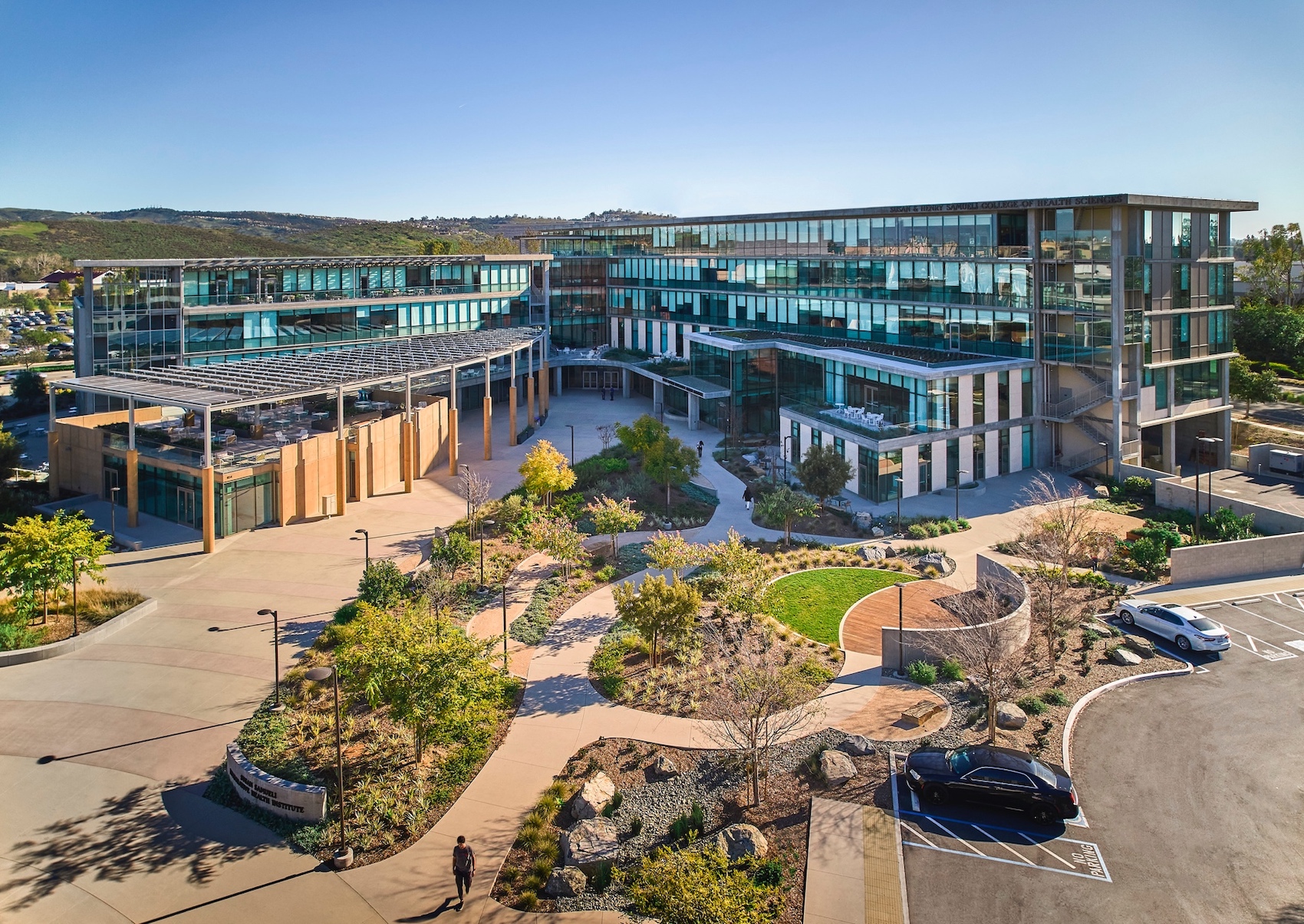
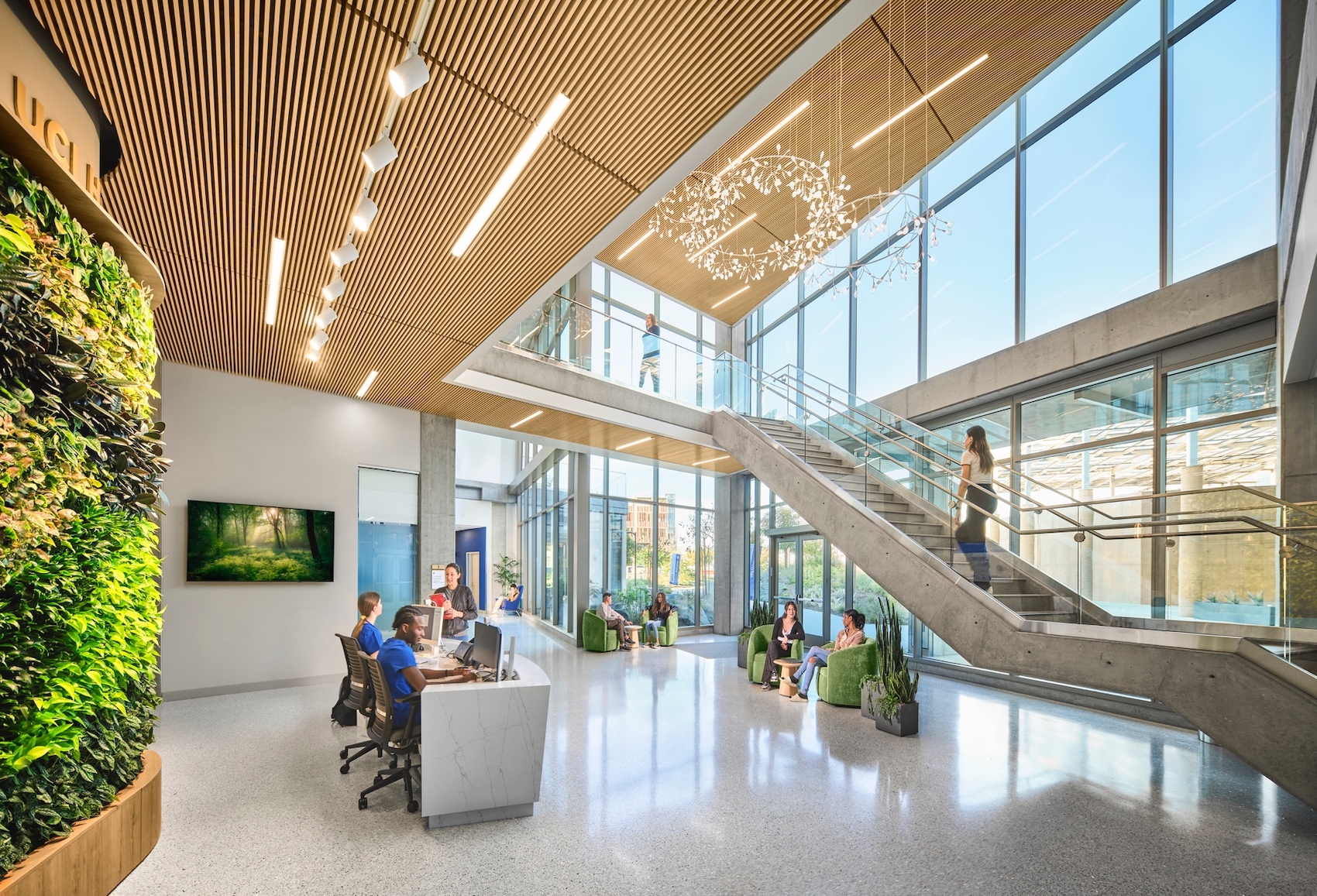
Related Stories
University Buildings | Jun 18, 2024
UC Riverside’s new School of Medicine building supports team-based learning, showcases passive design strategies
The University of California, Riverside, School of Medicine has opened the 94,576-sf, five-floor Education Building II (EDII). Created by the design-build team of CO Architects and Hensel Phelps, the medical school’s new home supports team-based student learning, offers social spaces, and provides departmental offices for faculty and staff.
Education Facilities | Jun 6, 2024
Studio Gang designs agricultural education center for the New York City Housing Authority
Earlier this month, the City of New York broke ground on the new $18.2 million Marlboro Agricultural Education Center (MAEC) at the New York City Housing Authority’s Marlboro Houses in Brooklyn. In line with the mission of its nonprofit operator, The Campaign Against Hunger, MAEC aims to strengthen food autonomy and security in underserved neighborhoods. MAEC will provide Marlboro Houses with diverse, community-oriented programs.
Mass Timber | May 31, 2024
Mass timber a big part of Western Washington University’s net-zero ambitions
Western Washington University, in Bellingham, Wash., 90 miles from Seattle, is in the process of expanding its ABET-accredited programs for electrical engineering, computer engineering and science, and energy science. As part of that process, the university is building Kaiser Borsari Hall, the 54,000-sf new home for those academic disciplines that will include teaching labs, research labs, classrooms, collaborative spaces, and administrative offices.
University Buildings | May 30, 2024
Washington University School of Medicine opens one of the world’s largest neuroscience research buildings
In St. Louis’ Cortex Innovation District, Washington University School of Medicine recently opened its new Jeffrey T. Fort Neuroscience Research Building. Designed by CannonDesign and Perkins&Will, the 11-story, 609,000-sf facility is one of the largest neuroscience buildings in the world.
K-12 Schools | May 15, 2024
A new Alabama high school supports hands-on, collaborative, and diverse learning
In Gulf Shores, a city on Alabama’s Gulf Coast, a new $137 million high school broke ground in late April and is expected to open in the fall of 2026. Designed by DLR Group and Goodwyn Mills Cawood, the 287,000-sf Gulf Shores High School will offer cutting-edge facilities and hands-on learning opportunities.
University Buildings | May 10, 2024
UNC Chapel Hill’s new medical education building offers seminar rooms and midsize classrooms—and notably, no lecture halls
The University of North Carolina at Chapel Hill has unveiled a new medical education building, Roper Hall. Designed by The S/L/A/M Collaborative (SLAM) and Flad Architects, the UNC School of Medicine’s new building intends to train new generations of physicians through dynamic and active modes of learning.
K-12 Schools | May 7, 2024
World's first K-12 school to achieve both LEED for Schools Platinum and WELL Platinum
A new K-12 school in Washington, D.C., is the first school in the world to achieve both LEED for Schools Platinum and WELL Platinum, according to its architect, Perkins Eastman. The John Lewis Elementary School is also the first school in the District of Columbia designed to achieve net-zero energy (NZE).
K-12 Schools | Apr 30, 2024
Fully electric Oregon elementary school aims for resilience with microgrid design
The River Grove Elementary School in Oregon was designed for net-zero carbon and resiliency to seismic events, storms, and wildfire. The roughly 82,000-sf school in a Portland suburb will feature a microgrid—a small-scale power grid that operates independently from the area’s electric grid.
Mass Timber | Apr 25, 2024
Bjarke Ingels Group designs a mass timber cube structure for the University of Kansas
Bjarke Ingels Group (BIG) and executive architect BNIM have unveiled their design for a new mass timber cube structure called the Makers’ KUbe for the University of Kansas School of Architecture & Design. A six-story, 50,000-sf building for learning and collaboration, the light-filled KUbe will house studio and teaching space, 3D-printing and robotic labs, and a ground-level cafe, all organized around a central core.
ProConnect Events | Apr 23, 2024
5 more ProConnect events scheduled for 2024, including all-new 'AEC Giants'
SGC Horizon present 7 ProConnect events in 2024.


